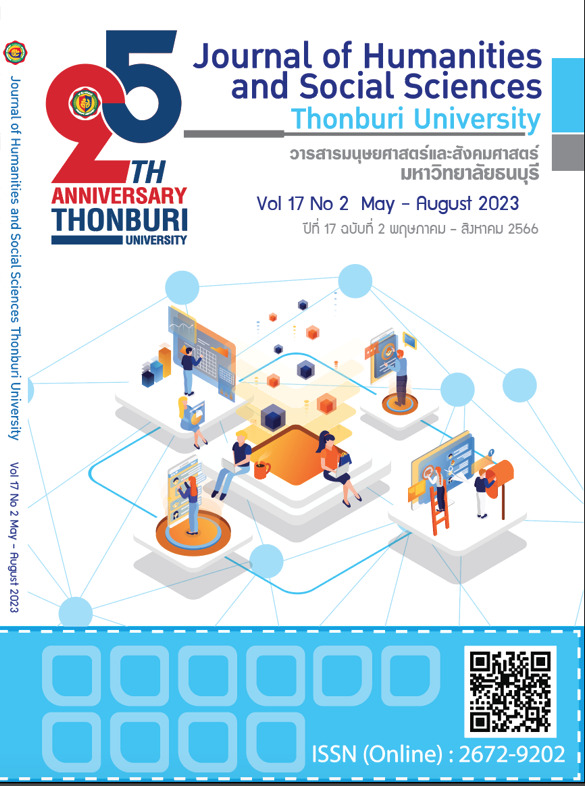Behavioral Economics for building Food Security Under the Situation of COVID 19 in T.Klongprab A.Bannasarn Suratthani Province
Keywords:
Food security, COVID-19, Household, Behavioral economicsAbstract
This research aims to study people's behavior by using behavioral economics for food security and to study the approach to building food security in households in Khlong Prap Subdistrict, Na San District, Surat Thani Province under the situation of COVID-19. The data used in this research were data obtained from interviews with households located in Khlong Prap Subdistrict, Na San District, Surat Thani Province. and small group meetings A questionnaire with a sample size of 350 households. The statistics used for analysis were mean, standard deviation, percentage, regression analysis. The results of the study revealed that the food security behaviors in a hypothetical Scenario 1 there is no COVID-19 epidemic in Thailand. The probability of choosing to building food security in the food sufficiency dimension (dimension 2) was 0.9824 the highest, followed by food self-sufficiency (dimension 1) was 0.0099. and building career and income stability (dimension 4) equal to 0.0077 Scenario 2 There is an outbreak of the Covid-19 epidemic in Thailand, and there are lockdown measures prohibiting crossing the area from the inter-provincial area, going out for a limited time. The probability of food self-sufficiency (dimension 1) was 0.9909, followed by sufficiency of food for consumption (dimension 2) was 0.0088. and building the stability of the natural resource base (dimension 3) equal to 0.0003. Scenario 3 There is an outbreak of the COVID-19 epidemic in Thailand and there are no lockdown measures. The probability of food self-sufficiency (dimension 1) was the highest, 0.6894, followed by building sufficiency of food for consumption (dimension 3) equal to 0.3101 and building security of occupation and income (dimension 4) equal to 0.0005. Approaches to promoting food security, local authorities can create reinforcements in building food security. building a group process to bring about food security.
References
กระทรวงสาธารณสุข. (2565). สถานการณ์โรคติดเชื้อไวรัสโคโรนา 2019. สืบค้นเมื่อ 30 กันยายน 2565, จาก https://media.thaigov.go.th/uploads/public_img/source/190865.pdf
กฤษฎา สุขพัฒน์. (2564). ผลกระทบจากการระบาด COVID-19 ต่อความยากจน บทบาทขององค์กรนานาชาติ และข้อเสนอในการขจัดความยากจนของประเทศไทย. วารสารสังคมภิวัฒน์. 12(1): 68-89.
ณัฐสุรางค์ ปุคคละนันทน์และคณะ (2565). พฤติกรรมการใช้ชีวิต การปรับตัว และการเรียนรู้ของประชาชนในสถานการณ์การแพร่ระบาดของโรคโควิด-19 (COVID-19) สู่การปรับตัวของชุมชนวิถีใหม่ในพื้นที่จังหวัดสุรินทร์. วารสารการบริหารนิติบุคคลและนวัตกรรมท้องถิ่น. 8(8):321-336.
ดาว ชุ่มตะขบ. (2563). เศรษฐกิจพอเพียง ทางเลือก ทางรอดฝ่าวิกฤตโควิด-19. วารสารสังคมวิจัยและพัฒนา. 2(3): 11- 22.
นัฐศิพร แสงเยือน, ธนาศรี สัมพันธารักษ์ เพ็ชรยิ้ม และ ประภัสรา นาคะ พันธุ์อำไพ. (2561). สวนครัวเรือน ความมั่นคงทางอาหารในครัวเรือนชุมชนวัดบางอ้อยช้าง จังหวัดนนทบุรี. วารสารวิจัยเพื่อการพัฒนาเชิงพื้นที่. 10(6): 471-483.
เพชรพริ้ง แพงคำรักษ์ และสุกัลยา เชิญขวัญ. (2564). ผลกระทบและการรับมือต่อการแพร่ระบาดโควิด-19 (ระลอก 1) ของครัวเรือนเกษตรกร กรณีศึกษาบ้านโนนศิลา ตำบลแวงน้อย อำเภอแวงน้อย จังหวัดขอนแก่น. วารสารมนุษยศาสตร์และสังคมศาสตร์ มหาวิทยาลัยราชภัฏอุดรธานี. 10(2): 93-110.
สำนักงานสถิติแห่งชาติ. (2563). จำนวนครัวเรือนพื้นที่ตำบลคลองปราบ อำเภอนาสาร จังหวัดสุราษฎร์ธานี. สืบค้นเมื่อ 30 กันยายน 2564, จาก http://www.nso.go.th.
Yamane, T. (1976). Statistics: An introductory analysis. 2nded. New York: Harper and Row.
Translated Thai References
Chumtakhob, D. (2020). Sufficiency Economy: An Alternative Survival Strategy for the COVID-19 Pandemic. Journal of Multidisciplinary Academic Research and Development. 2(3): 11-22. (in Thai)
Ministry of Public Health. (2019). Coronavirus Disease Situation 2019. Retrieved September 30, 2022, from https://media.thaigov.go.th/uploads/public_img/source/190865.pdf (in Thai)
National Statistical Office. (2020). Number of households in Khlong Prap Subdistrict, Na San District, Surat Thani Province. Retrieved September 30, 2021, from http://www.nso.go.th. (in Thai)
Paengkumruk, P.; & Choenkwan, S. (2021). Impacts and Coping Strategies on COVID-19 Pandemic (First Wave) of Agricultural Households : A Case Study in Nonsila Village, Waeng Noi Sub-district, Waeng Noi District, Khon Kaen. Udon Thani Rajabhat University Journal of Humanities and Social Sciences. 10(2): 93-110. (in Thai)
Pukkalanan, N. et al. (2022). Living Behavior, Adaptation and Learning of People in the Situation of the Epidemic of COVID-19 Towards the Adaptation of the Community in New Normal Life at Surin Province. Journal of Legal Entity Management and Local Innovation. 8(8): 321-336. (in Thai)
Sangyuan, N.; Petyim, T. & PhanumphaiHome, P. (2018). Garden Household Food Security in Wat Bang Aoi Chang Community, Nonthaburi Province. Area Based Development Research Journal. 10(6): 471-483. (in Thai)
Sukkaphat, K. (2021). The Impact of the COVID-19 outbreak on Poverty, Role of International Organizations, and Suggestion of Poverty Elimination in Thailand. Journal of Social Synergy. 12(1): 68-89. (in Thai)
Downloads
Published
How to Cite
Issue
Section
License
Copyright (c) 2023 PONGPIPAT MAKCHOUY

This work is licensed under a Creative Commons Attribution-NonCommercial-NoDerivatives 4.0 International License.
ผลงานที่ปรากฎในวารสารฉบับนี้เป็นลิขสิทธิ์เฉพาะส่วนบุคคลของผู้เขียนซึ่งต้องรับผิดชอบต่อผลทาง กฎหมายที่อาจเกิดขึ้นได้และไม่มีผลต่อกองบรรณาธิการ






